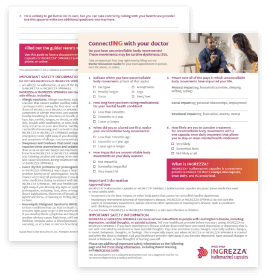Tardive dyskinesia (TD): Persistent, uncontrolled body movements

Don’t ignore persistent, uncontrollable body movements that could be TD.
Have you experienced any of the following uncontrollable movements?
YOU ARE NOT ALONE

It’s estimated at least
800,000
people in the US
are affected by TD
—and most have not been diagnosed.
TD can occur anywhere in the body. Watch the videos below to see what TD symptoms can look like.
Lip smacking, puckering, or pursing
Actor portrayal
Tongue darting or protrusion
Actor portrayal
Jaw sawing or chewing
Actor portrayal
Excessive blinking
Actor portrayal
Upper body rocking, jerking, or thrusting
Actor portrayal
Twisting hands or dancing fingers
Actor portrayal
Gripping feet or stretched toes
Actor portrayal
Actor portrayal
TD is unlikely to get better on its own, but you can take control by talking with your healthcare provider about your movements right away. Take the first step: Understand the cause of your uncontrollable movements and learn about treatment.
TD is a distinct condition and different from other drug-induced movement disorders. How it is treated may be different, too.
Ask your healthcare provider about reducING uncontrollable movements with INGREZZA® (valbenazine) capsules. INGREZZA is a treatment proven to reduce TD that’s always one capsule, once daily, and #1 prescribed.
What medicines can cause tardive dyskinesia (TD)?
You may have been prescribed certain mental health medicines (antipsychotics) to treat one of these conditions:
- Depression
- Bipolar disorder
- Schizophrenia
- Schizoaffective disorder
Certain prescription medicines used to treat gastrointestinal disorders may also cause TD.
Medications that may cause TD
With INGREZZA, you can keep takING most mental health medicines.
If you are currently taking antipsychotic medicine, do not stop, adjust, or switch your medicine without talking to your healthcare provider.
Continue taking your medicine as prescribed and be sure to talk to your healthcare provider about TD and FDA-approved treatments, like INGREZZA.
The impact of tardive dyskinesia (TD) can go beyond physical ability.

“Because of my TD, I was embarrassed to be out in public. I would chew gum a lot to mask the movement of my jaws. I wouldn’t attend work outings, family functions. I missed a lot of milestones because I would seclude myself.”
Individual results may vary
– Steve, living with bipolar disorder and tardive dyskinesia
Steve was compensated by Neurocrine Biosciences, Inc. to share his story
Based on a survey, people reported TD can impact them emotionally or socially.*,†
Is TD impactING you emotionally or socially? Be sure to tell your healthcare provider about how these feelings are affecting your personal life and relationships.
Take control: start by askING your doctor about INGREZZA. INGREZZA is proven to reduce TD, always one capsule, once daily, and #1 prescribed.


You’re not alone in talking about tardive dyskinesia (TD)
Thousands of people have already taken the first step toward talking with their healthcare provider about TD. Within the last year,†‖*‡ the Doctor Discussion Guide has been downloaded over 4000 times, helping people feel more prepared and supported during this important conversation.
†‖*‡Source: Google Analytics 4. January 1, 2025–August 31, 2025.
Are you experiencing uncontrollable movements?
Sign up for info

Caring for a loved one with tardive dyskinesia?
Actor portrayals






